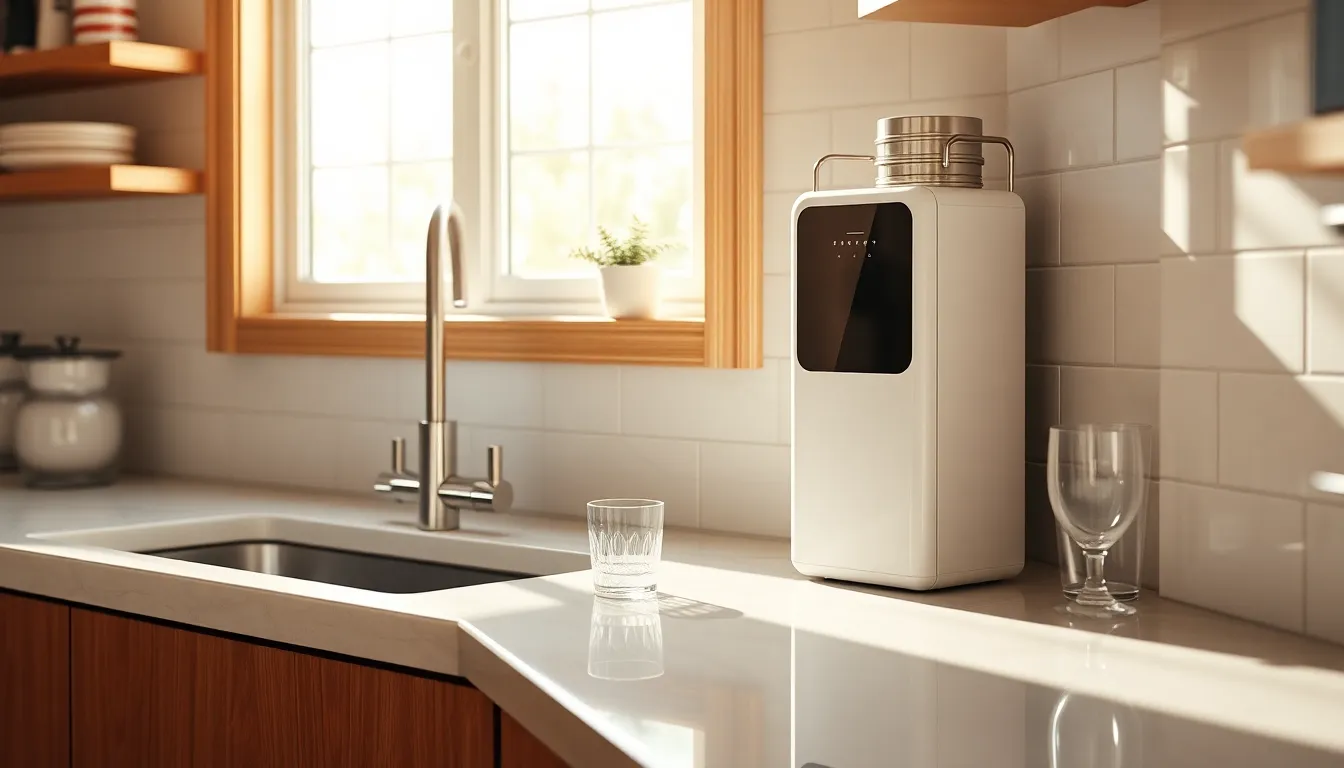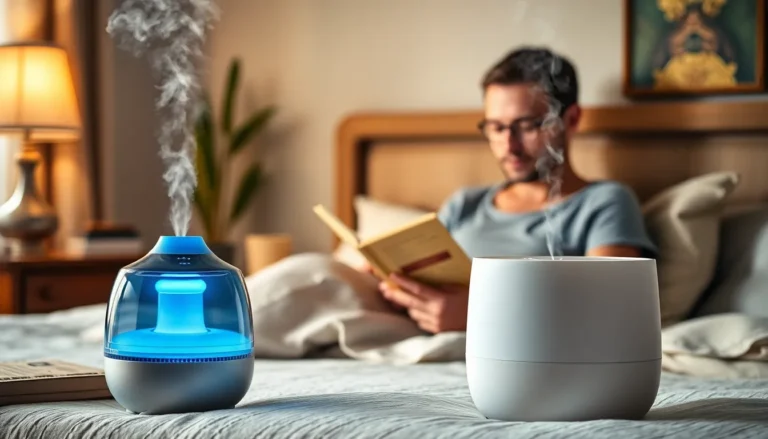In a world where hydration is key, why settle for anything less than crystal-clear water? Water purifier systems are the unsung heroes of our kitchens, transforming tap water into a refreshing oasis. With the right system, it’s like having a mini water factory right at home—minus the hard hats and safety goggles.
Table of Contents
ToggleOverview of Water Purifier Systems
Water purifier systems play a critical role in providing safe drinking water. These systems effectively eliminate contaminants, including bacteria, viruses, and heavy metals. Various technologies like reverse osmosis and UV filtration offer protection against harmful impurities.
Types of water purifiers vary widely. Reverse osmosis systems utilize a semi-permeable membrane to remove contaminants. Activated carbon purifiers absorb chemicals and improve taste through filtration. UV water purifiers use ultraviolet light to disinfect water by targeting microorganisms.
Each type of system has its own benefits. For instance, reverse osmosis offers thorough filtration for those in areas with poor water quality. Activated carbon systems are effective solutions for reducing chlorine and other taste-altering impurities. UV purifiers are quick and efficient, making them suitable for immediate use.
Installation methods differ among systems. Under-sink units save counter space while providing easy access to purified water. Countertop systems are portable and convenient for renters. Some whole-house systems connect directly to plumbing, ensuring all household water receives purification.
Maintenance is essential for optimal performance. Users should replace filters regularly to ensure continued effectiveness. Routine cleaning can prevent sediment build-up and enhance the system’s lifespan.
Buying a water purifier involves considering several factors. Water quality testing is crucial to determine specific needs. Additionally, evaluating budget constraints can help guide the selection process.
Water purifier systems significantly contribute to hydration in homes. They transform tap water into a refreshing and healthy drinking source, making them invaluable kitchen appliances.
Types of Water Purifier Systems

Water purifier systems come in various types, each designed to address specific water quality issues. Understanding these types assists in selecting the most suitable system for safe drinking water.
Reverse Osmosis Systems
Reverse osmosis systems utilize a semi-permeable membrane to remove impurities from water. These systems effectively eliminate contaminants like bacteria, viruses, and heavy metals. A multi-stage filtration process enhances the overall quality. As a result, they’re ideal for areas with high levels of dissolved solids. Many systems also include additional filters for improved taste and odor. Regular maintenance involves replacing filters to ensure optimal performance.
UV Water Purifiers
UV water purifiers use ultraviolet light to disinfect water by targeting harmful microorganisms. This technology neutralizes bacteria and viruses without adding chemicals. Quick disinfection occurs as water passes through the UV chamber. Systems typically require minimal maintenance, mainly focusing on changing the UV lamp annually. They excel in providing effective treatment for clear, non-turbid water. Consumers appreciate the lack of chemical residues, making it a popular choice for health-conscious households.
Activated Carbon Filters
Activated carbon filters excel at improving water taste and removing chlorine. These filters capture organic compounds and harmful chemicals through adsorption. Various designs are available, including pitcher filters and faucet-mounted options. Performance varies based on carbon quality and contact time with water. Filters require regular replacement to maintain effectiveness. These systems offer a cost-effective solution for enhancing drinking water quality and are suitable for most households.
Benefits of Water Purifier Systems
Water purifier systems offer numerous advantages that enhance health and support environmental sustainability. These systems significantly improve the quality of drinking water, making it safe and enjoyable.
Health Benefits
Health benefits play a critical role in selecting a water purifier. These systems effectively remove contaminants like bacteria, viruses, and heavy metals, greatly reducing health risks. Drinking purified water helps to prevent waterborne diseases, which can lead to serious health complications. Furthermore, reverse osmosis systems excel in eliminating harmful dissolved solids, contributing to better hydration. Also, drinking clean water supports overall health by improving absorption of nutrients. A cleaner water source directly leads to enhanced physical well-being, which is vital for maintaining an active lifestyle.
Environmental Impact
Environmental impact is another important consideration. Water purifier systems reduce reliance on bottled water, thereby decreasing plastic waste. Each purified gallon of water saved means fewer plastic bottles in landfills and oceans. Additionally, these systems consume less energy compared to traditional water heating methods, promoting better resource conservation. Activated carbon filters contribute to this endeavor by minimizing chemical waste during the filtration process. By investing in a water purification system, households can reduce their environmental footprint while enjoying superior water quality.
Choosing the Right Water Purifier System
Choosing the right water purifier system involves understanding specific needs and preferences. Key factors influence this decision.
Factors to Consider
Water quality remains a top priority. Testing local water for contaminants helps identify specific filtration needs. Installation type can impact convenience; under-sink units save counter space while countertop models offer portable solutions. Budget constraints also play a vital role, as prices vary significantly among brands and technologies. Maintenance requirements differ; some systems need more frequent filter replacements than others. Storage capacity should not be overlooked, especially for larger households. Lastly, additional features, such as digital displays or UV lights, enhance functionality.
Top Brands and Models
Several brands dominate the water purifier market. A.O. Smith offers advanced reverse osmosis systems known for high efficiency. Brita remains popular for its affordable activated carbon filters, making taste improvement accessible. Others, such as Culligan, provide customizable solutions for various household sizes. Each brand features unique models catering to diverse needs. For instance, the Whirlpool WHESFC is renowned for its whole-house filtration. The PUR FM2500V stands out for its sleek countertop design and ease of use. Researching customer reviews can help narrow down choices for optimal satisfaction.
Investing in a water purifier system is a proactive step toward ensuring clean and safe drinking water at home. With various technologies available each offering unique advantages, families can choose a system that best fits their needs. Regular maintenance and thoughtful selection based on local water quality can enhance the benefits these systems provide.
In addition to improving health and hydration, water purifiers contribute to environmental sustainability by reducing plastic waste. By making informed choices and prioritizing water quality, households can enjoy the numerous advantages of purified water while fostering a healthier lifestyle.





